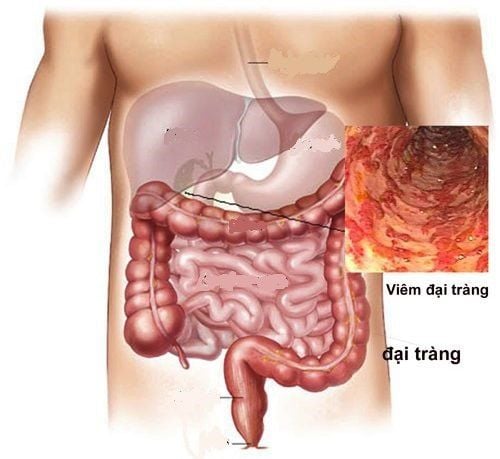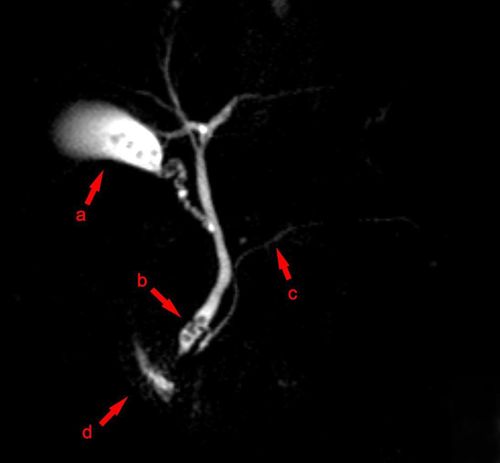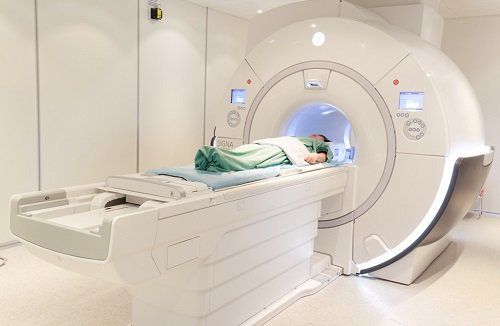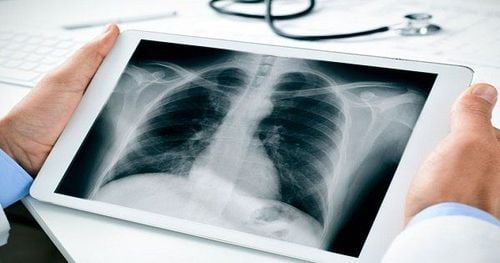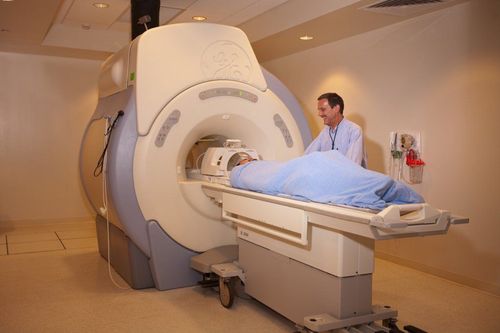This is an automatically translated article.
Magnetic resonance imaging is an advanced method with highly accurate diagnostic results, so it has been applied in many large hospitals today. The technique uses magnetic fields and radio waves, so is magnetic resonance imaging actually harmful?1. What is magnetic resonance imaging?
Magnetic resonance imaging (MRI) is a technique that uses a magnetic resonance machine to create cross-sectional images of parts of the body, helping doctors check and evaluate pathologies without invasive intervention. This method is used to monitor the response to treatment and support the diagnosis of a number of diseases including:Heart, liver, kidney disease,...; Diseases of the brain and spinal cord; Deformities on the body; Checking for abnormal tumors and cysts on different organs of the body; Diagnosis of injuries; Evaluation of pelvic pain in women; Diseases related to bones and joints such as ligament rupture, disc herniation,... Advantages of magnetic resonance imaging technique:
It is a non-invasive, safe, non-toxic and non-toxic imaging technique. not affected by radiation; There are many applications in the diagnosis and treatment of many different diseases; Has high soft tissue resolution; Cerebral angiography can be obtained even without the use of contrast agents; Show better images than X-rays and computed tomography; Accurate assessment of cerebral perfusion status and sports injuries.
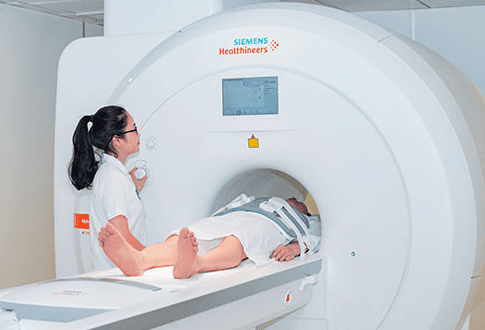
Chụp cộng hưởng từ (chụp MRI) là kỹ thuật sử dụng máy cộng hưởng từ để tạo ra hình ảnh lát cắt của các bộ phận trên cơ thể
2. Is magnetic resonance imaging harmful?
Magnetic resonance imaging is a relatively safe, accurate and non-invasive method. In fact, this technique has been gradually replacing many methods of using invasive devices (which cause pain and harm to the patient).Usually, an MRI scan can detect abnormalities hidden behind the bone without using X-rays (like X-rays or CT scans) so there's no need to worry about side effects.
Magnetic resonance imaging has also been shown to be harmless to the fetus. However, pregnant women in the first 3 months (the period of formation of fetal organs) should still be cautious, only taking MRI when absolutely necessary, with the appointment of a doctor.
Although not harmful to the body, the high magnetic field of the magnetic resonance imaging machine can harm metal implanted devices in the body. The magnetic field emitted by the machine is very strong, which can damage the defibrillator and artificial pacemaker in the heart; displacement of blood vessel clamps in the brain causing cerebral hemorrhage; moving metal objects in the eye causes retinal tear and blindness,... Besides, in some cases where contrast injection is needed, some allergic symptoms such as dizziness, headache, etc. nausea and vomiting, numbness in the limbs, rash, itching, etc. These side effects are usually mild and disappear completely if anti-allergic drugs are used.
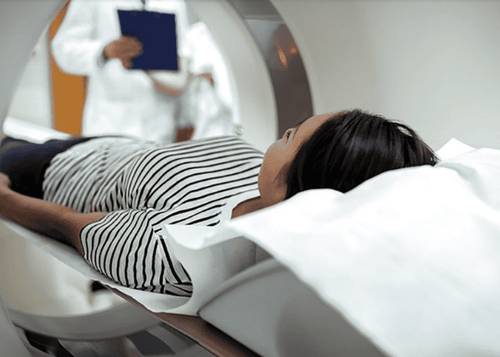
Tuy không gây hại cho cơ thể nhưng từ trường cao của máy chụp cộng hưởng từ có thể gây hại cho các thiết bị cấy ghép bằng kim loại trong cơ thể
3. Notes to ensure safety when taking MRI
The person assigned to have an MRI scan should pay attention to the following issues to ensure safety and obtain accurate diagnosis:Remove metal objects on the body such as jewelry, watches, dentures , ATM card, magnetic key,...; Coordinate with medical staff to use specialized tools to examine foreign bodies and metal devices placed in the body. People who have a foreign body with a needle in their eyes, heart, brain, lungs, etc. should not have an MRI. If there is a metal foreign body in other locations, consult your doctor to decide whether to have an MRI; Tattoos on the body or makeup on lips, eyelids, etc. with metallic luster often contain a little metal inside, so the skin at that location may be warmed up during magnetic resonance imaging. These signs are usually mild and transient. However, patients should also pay attention to limit makeup when taking MRI; Fasting for 4-6 hours before taking magnetic resonance imaging to check for pathology on the liver and bile; In cases where contrast injection is required, it is necessary to inform the doctor about the history of drug allergy because the drug can cause some allergic symptoms; In cases where contrast is injected into a vein in the wrist or forearm, the patient may feel a slight bitterness in the tongue or the whole body may feel warm. This is a normal symptom and will go away on its own in about 2 - 5 minutes; People with claustrophobia should not perform this method to avoid mental panic. Lie still and do not move during the MRI scan. Magnetic resonance imaging contributes to accurate diagnosis of bone and joint diseases, cancer, ... thereby helping the treatment process to take place more smoothly and effectively. This method is not harmful to health because it does not use ionizing radiation. However, if the safety regulations are not followed before, during and after the scan, it may harm the patient's health and affect the imaging equipment. Therefore, patients need to strictly follow the safety precautions mentioned above.
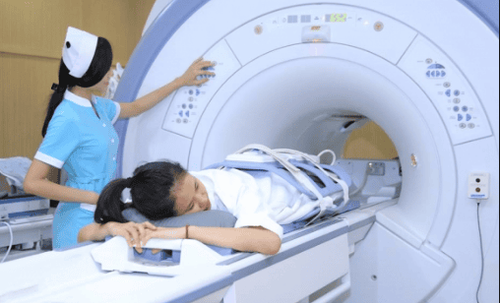
Chụp cộng hưởng từ góp phần chẩn đoán chính xác các bệnh lý về xương khớp, ung thư,...
Patients who perform MRI at Vinmec will be supported by the support staff, and the technical staff will clearly guide you on the best operations, procedures, safety issues, ensuring good diagnostic images without any problems. harm the patient.
Especially, now Vinmec has put into use for the first time in Southeast Asia a new magnetic resonance imaging machine 3.0 Tesla with Silent technology from the US manufacturer GE Healthcare /
The machine now applies magnetic resonance imaging technology. Safe, most accurate today, no X-ray, non-invasive. In particular, Silent technology is very beneficial for patients who are young children, the elderly, patients with weak health or have just had surgery.
For detailed information, please contact the hospitals and clinics of Vinmec health system nationwide.
Please dial HOTLINE for more information or register for an appointment HERE. Download MyVinmec app to make appointments faster and to manage your bookings easily.
MOREWhat are the benefits of Magnetic Resonance Imaging (MRI)? When do you need a magnetic resonance imaging (MRI) scan? Notes on magnetic resonance imaging (MRI) of the brain and spinal cord





